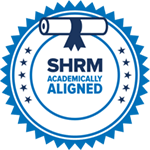Why Choose Walden?
Choose this track if you do not have a recognized human resource professional certification.
Curriculum
Minimum Degree Requirements
- 50 quarter credits:
- Core courses (45 qtr. cr.)
- Capstone (5 qtr. cr.)
View the COMPLETE CURRICULUM PLAN.
Choose this track if you’re an experienced HR professional and would like to tailor your program to your goals and interests.
Curriculum
Minimum Degree Requirements
- 50 quarter credits:
- Core courses (20 qtr. cr.)
- Elective courses (25 qtr. cr.)
- Capstone (5 qtr. cr.)
View the COMPLETE CURRICULUM PLAN.
Admission Requirements
Program Admission Considerations: A bachelor's degree or higher.
General Admission Requirements: Completed online application and transcripts. Please note that the materials you are required to submit may vary depending on the academic program to which you apply. More information for international applicants.
Choose From Two Capstone Options
You’ve got choices with Walden’s MS in Human Resource Management program. If you’re looking for hands-on experience as an HR strategist, opt for our traditional capstone format. If your focus is pursuing SHRM certification, the Meeting SHRM Competencies capstone can help set you up for success.
Capstone Option 1: Strategic Human Resource Management
Learn how today’s HR leaders can make significant contributions to the executive strategic planning process. Discuss how to align human resource strategies with the organization’s overarching business goals. Examine how HR can help create a competitive advantage in order to drive organizational success.

Capstone Option 2: Meeting SHRM Competencies
Explore the HR content outlined in the SHRM Body of Applied Skills and Knowledge (BASK) competencies within the four SHRM Certified Professional Domain modules: Leadership, Interpersonal, Business and Human Resources Knowledge. Complete a sample exam reflecting actual SHRM certification exams.
| CURRICULUM COMPONENT | REQUIREMENTS | COST | AMOUNT |
|---|---|---|---|
| Tuition | 50 quarter credit hours | $620 per quarter hour | $31,000 |
| Program Fee | Per quarter | $175 | $875 |
| $31,875** | |||
| BELIEVE & ACHIEVE SCHOLARSHIP YOUR TUITION | -$6,200 $25,675* | ||
*Represents course-based learning format, minimum time to completion, and Believe and Achieve Scholarship. Your actual total program time and costs may vary.
**Tuition reflects the minimum time to completion. Time to completion varies by student, depending on individual progress and credits transferred, if applicable. Tuition and time to complete may be reduced if transfer credits are accepted, or if you receive grants, scholarships or other tuition reductions. Walden may accept up to 25 transfer credits. For a personalized estimate of the number of your transfer credits that Walden would accept, call an Enrollment Specialist at 844-853-3374.
Tuition and fees are subject to change. Books and materials are not included and may cost between $1,000 and $1,400.
Progress at Your Pace. Control Your Cost.
Walden’s Tempo Learning® programs follow a subscription-based pricing format. Students are billed a flat-rate for each 3-month subscription term. All pricing is represented in U.S. dollars and is subject to change.
| Program | Subscription Period Tuition | Subscription Period PROGRAM Fee | Subscription Period Time Frame |
|---|---|---|---|
| MS in Human Resource Management | $3,000 | $175 | 3-month subscription period |
| You may be able to complete your MS in Human Resource Management degree in 15 months for under $13,000.* | |||
*Represents Tempo Learning® format, Believe & Achieve Scholarship, and the fastest pace of our top 25% transfer students in this program in the Tempo Learning® format. Your actual total program time and costs will depend on your individual pace and transfer credits. A student’s pace is usually determined by their experience, ability to work independently, and availability. Believe & Achieve Scholarship savings based on current tuition. See Scholarship Details for more information.
Financial Aid
Financial aid is available for this program. Our financial aid advisors can help you identify funding opportunities to help you pay for your education.
With Tempo Learning, you may be able to complete your MS in Human Resource Management degree in as few as 13 months for as low as $13,000.*
*Represents Tempo Learning® format, Believe & Achieve Scholarship, and the fastest pace of our top 25% transfer students in this program in the Tempo Learning® format. Your actual total program time and costs may vary. Tuition and fees are subject to change. See Tuition and Fees section and Scholarship Details for more information.
Program Outcomes
Build Business Skills for Good
Whether you want to be a functional specialist or HR leader, Walden’s master's in human resource management program prepares you to be a force for change—in your career, in your workplace, and in your community. We’ve combined practical learning experiences and SHRM-aligned coursework to help put you at the forefront of an evolving field. Gain the advanced skills you need to empower your organization and create a more diverse and equitable world of business.
Career Impact – Online MS in Human Resource Management
As companies prioritize social responsibility and seek to build more inclusive cultures, socially minded HR professionals have a major opportunity to guide them through these changes. HR professionals with certification or a master’s degree are expected to have the best job prospects.2
An online master’s in human resource management can also potentially lead to higher earnings. According to the U.S. Bureau of Labor Statistics (BLS), the median annual wage for human resource managers was $121,200 in May 2020, with overall salaries ranging from $71,180 to $208,000 depending on skills and years of experience.2
An MS in Human Resource Management degree can prepare you to pursue career options such as:3
- Human resources specialist
- Human resources manager
- Training and development specialist
- Compensation/benefits analyst
An MS in Human Resource Management degree can prepare you to work in settings such as:
- Healthcare and social assistance
- Finance and insurance
- Educational services
- Manufacturing
Career options may require additional experience, training, or other factors beyond the successful completion of this degree program.
Learning Outcomes
As a graduate of Walden’s online MS in Human Resource Management program, you’ll be prepared to:
- Demonstrate human resources knowledge in relation to being an internal strategic partner.
- Evaluate the strategic role of human resources in creating organizational capacity and agility.
- Examine the role of human resources in legal and regulatory compliance of an organization.
- Appraise the role of human resources in change management.
- Evaluate the role of human resources in facilitating social change opportunities.
- Demonstrate an understanding of human resource leadership responsibilities as an internal strategic partner.
Testimonials
FAQ About Walden’s Online MS in Human Resource Management
Human resource management is the business of managing an organization’s most valuable asset: people. If a business has employees, there is likely a human resource professional to help recruit, develop, and retain them. And many of these HR professionals, especially at the mid- and senior-management levels, hold a master’s degree in human resources, education and training that helps them provide value to both their organization and its employees.
Among the options available to you when deciding where to earn your MS in Human Resource Management are your alma mater, a local college, or an online university. Unfortunately, you may not live near your former university. And attending classes on a local campus often means commuting and being obligated to a fixed time frame. Many working adults and those with other time demands choose an accredited online institution like Walden University to earn their master’s and further their HR career.
According to the Bureau of Labor Statistics, demand for human resource professionals is on the rise. Between 2019 and 2029, more than 10,400 human resource managers and about 46,900 human resource specialists will be needed.* That’s a lot of opportunity, particularly for anyone who holds the right degree and credentials. Candidates with certification or a master’s degree—particularly those with a concentration in human resource management—should have the best job prospects.
*Bureau of Labor Statistics, Occupational Outlook Handbook, Human Resources Managers and Human Resources Specialists. National long-term projections may not reflect local and/or short-term economic or job conditions, do not guarantee actual job growth, and are subject to change.
When looking to enroll in an HR management master’s program, you want to make sure it meets the requirements outlined by the Society for Human Resource Management (SHRM). Walden’s MS in Human Resource Management program fully aligns with the SHRM’s HR Curriculum Guidebook and Templates, which helps define HR education standards and helps business schools develop degree programs that follow these standards.
An advanced degree can be an asset. Degree programs go into much more breadth and depth of content than a certification course requires. In the competitive environment we all face today, having a graduate degree may be the differentiator for career advancement or new opportunities. Many programs offer course credit in recognition of an active certification from SHRM, HRCI, or IPMA-HR. Walden recognizes certification from all three, which can potentially save you time and money in the completion of the MS in Human Resource Management program.
There are many different careers and roles in human resource management, and most positions fall into one of two categories—HR generalist or HR specialist. The generalist’s role covers a wide range of responsibilities, including:
- Staffing
- Training and development
- Workforce diversity
- Compensation management
- Personnel and workplace policies and procedures
Large organizations require an HR specialist with knowledge in specific areas of human resources. Some of the more common HR specialist roles include:
- Workforce planning and employment
- Talent management
- Compensation and benefits manager
- Employee and labor relations
- Risk management
1Course content reflects the SHRM Body of Competency and Knowledge. This course of study will in no way guarantee or assure success on the SHRM-CP® or SHRM-SCP® exam. Students must use the most recent edition of the SHRM® educational products for this course and may not use outdated materials.
2Source: Bureau of Labor Statistics, Occupational Outlook Handbook, Human Resources Managers and Pay. Retrieved September 2021 using SOC code 11-3121. National long-term job growth projections and salaries may not reflect local and/or short-term economic or job conditions, do not guarantee actual job growth or salaries, and are subject to change.
3Source: National Center for O*NET Development. Quick Search. O*NET OnLine. Retrieved September 3, 2021, from https://www.onetonline.org/find/quick
At the graduate level, the Master of Business Administration (MBA) is the only program accredited by the Accreditation Council for Business Schools and Programs (ACBSP). The MS in Human Resource Management is not accredited by the ACBSP. Please visit our accreditation page to see the list of Walden accreditations.













